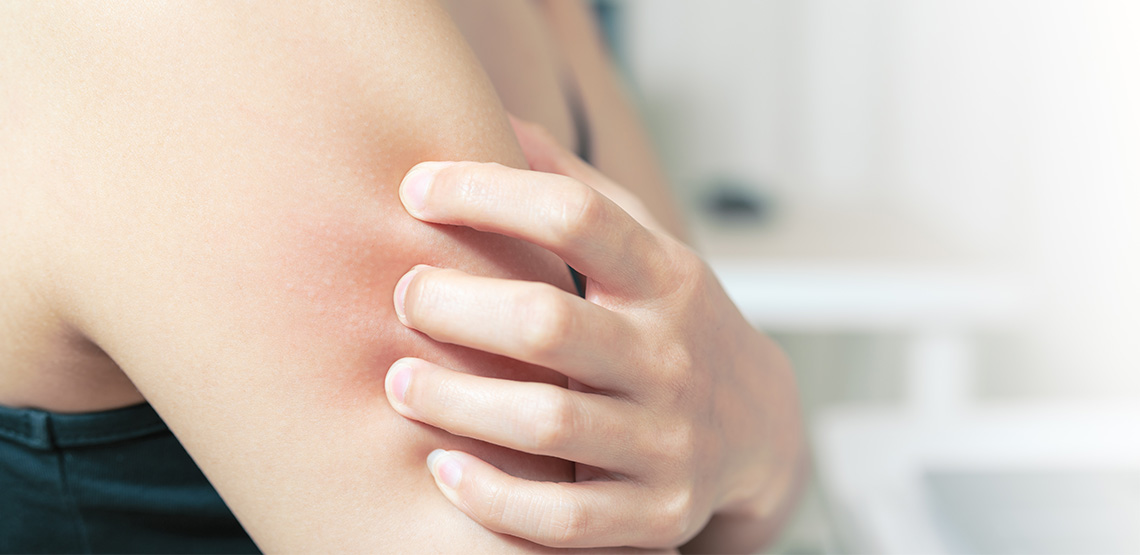Chronic Itching
We’ve all experienced itching at some point or another. Sometimes it’s short-lived, like when you have a mosquito bite, but prolonged itching can have underlying health issues. If you’re feeling itchy and it’s become a constant in your life, you may have chronic itching.
What Is Chronic Itching?
Chronic itching goes by another name in some circles; it’s known as pruritus and it affects millions of people. Pruritus can originate directly in the skin or can develop in the central nervous system and send signals along a nerve network that notifies the brain of an itching sensation.
Itching that lasts more than six weeks is considered chronic itching. It may be localized or generalized and makes you want to scratch to relieve the itch. Chronic itching is worsened by dry skin, and the condition is common in older adults since skin naturally dries out with age.
Chronic itching can affect your quality of life by interrupting sleep or causing anxiety or depression
What Causes Chronic Itching?
Long-term relief requires identifying the cause of the itchy skin; however, diagnosis may not come easily. Itching is a feature of many skin conditions and occurs in many other medical conditions, or in response to some medications.
Some of the causes (and hypothesized causes) are:
- Skin conditions such as dry skin, eczema, psoriasis, scabies, burns, hives, hand-foot-and-mouth disease and scars
- Internal diseases including liver disease, kidney failure, iron deficiency anemia, thyroid problems and certain cancers
- Irritation to certain products and substances such as wool, chemicals, soaps, etc.
- Allergic reaction with poison ivy, parasites, cosmetics, etc.
- Reactions to certain drugs or medications
- A misfiring of nerve cells in nerve disorders such as multiple sclerosis, diabetes, pinched nerves, shingles, etc.
- Psychiatric diseases including anxiety, obsessive-compulsive disorder and depression
- Pregnancy; some women become itchy as their skin stretches to accommodate the growing baby
- Bacteria may play a part in pruritus, but research is ongoing
Symptoms of Chronic Itching
Symptoms are not universal and may depend on the severity of the itching sensation and how often or intensely you scratch. Common symptoms are:
- Red, rough or bumpy skin
- Scratching/rubbing may make the area itchier
- Prolonged scratching may cause raised thick areas that may bleed or may become infected
- Bumps, spots or blisters
- Dry or cracked skin
- Leathery or scaly skin
- Itch may last a long time or be intense
- The presence of a rash may help diagnose a dermatologic disorder
When to See a Doctor
When it comes to itching, it may be hard to tell when medical intervention is required. Certainly see your doctor or dermatologist if your itch has persisted longer than a few weeks.
Related Search Topics (Ads)
If your itching has lasted longer than a week, you should follow up with a doctor if you also have the following symptoms:
- Severe itching
- A rash that’s spreading or becoming worse
- Weight loss, fatigue or sweating through the night
If you’re itchy and experience any of the following, be sure to see a doctor immediately:
- Trouble breathing
- Feeling faint
- Pain in your stomach
- Yellowing of the skin and eyes
- Feeling very thirsty, urinating very frequently and losing weight
Treatment for Chronic Itching
Currently, chronic itching is generally treated with topical agents, but there are several options you can look into to resolve your itching woes. Your doctor or dermatologist will need to diagnose the cause of the itching in order to prescribe a treatment that will work in your specific case.
Current treatment options are:
- Medicated cooling lotions with elements to soothe or numb the skin, including calamine, pramoxine, or menthol and camphor
- Wet wrap therapy where you apply damp gauze to the affected area and leave it for hours or overnight
- Oral anti-itch medication such as antihistamines, which help relieve short-lived itching caused by allergies/insect bites but only partially alleviate chronic itching
- Other medications are available for generalized or neuropathic itch, which include remitch and morphine
- Topical treatments include anesthetics, antipruritics, cooling agents, corticosteroids and emollients
- Systemic treatments include antihistamines, corticosteroids, opioid-receptor antagonist
- Phototherapy uses light waves, usually ultraviolet B or ultraviolet A1, to treat certain conditions by shutting down immune system cells in the skin. Light therapy is used to treat skin conditions like psoriasis, eczema, mycosis fungoides and vitiligo
- Miscellaneous treatments: acupuncture, capsaicin, transcutaneous electrical stimulation
Researchers continue to develop new substances to treat chronic itchy skin and more options for treatment will hopefully become available in the future.
There are some everyday actions that can help relieve your chronic itching:
- Moisturizing daily with a product free of additives or fragrances
- Using gentle cleansers on your skin
- Bathing in lukewarm water (not hot water) and limiting your bath or shower to only 10 minutes
- Cool compresses/cool baths
- Taking an oatmeal bath
- Keeping yourself in a cool environment helps
- Wearing loose fitting, cotton clothes
- Reducing stress
Scratching feels good in the short term but isn’t a recommended way to solve your chronic itching. If you’ve found yourself itching with no relief for a while, consult your doctor or dermatologist. The solution to your chronic itching may be resolved by switching products, changing medication or diagnosing an unknown medical issue.
Article Resources
- Mayo Clinic (Itchy Skin (Pruritus))
- Cleveland Clinic (Pruritus)
- Harvard Medical School (Itch and the Brain)
- NIH (Investigating the Causes of Chronic Itch: New Advances Could Bring Relief)
- NCBI (Chronic Pruritus: Clinics and Treatment)
- American Academy of Dermatology (How to Relieve Itchy Skin)
- National Eczema Association (Wet Wrap Therapy)
- UVA Health (Phototherapy)
- MSD Manual Consumer Version (Itching)


